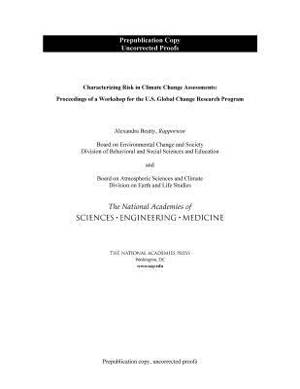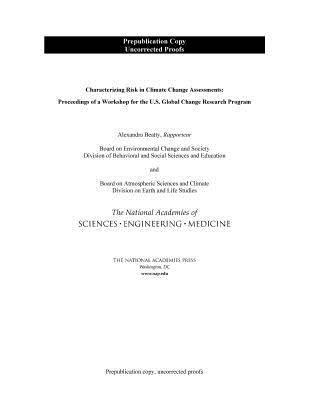
- Retrait gratuit dans votre magasin Club
- 7.000.000 titres dans notre catalogue
- Payer en toute sécurité
- Toujours un magasin près de chez vous
- Retrait gratuit dans votre magasin Club
- 7.000.0000 titres dans notre catalogue
- Payer en toute sécurité
- Toujours un magasin près de chez vous
Characterizing Risk in Climate Change Assessments
Proceedings of a Workshop
National Academies of Sciences Engineering and Medicine, Division on Earth and Life Studies, Board on Atmospheric Sciences and Climate, Division of Behavioral and Social Sciences and Education, Board on Environmental Change and SocietyDescription
The U.S. Global Change Research Program (USGCRP) was established in 1990 to "assist the Nation and the world to understand, assess, predict, and respond to human-induced and natural processes of global change."1 A key responsibility for the program is to conduct National Climate Assessments (NCAs) every 4 years.2 These assessments are intended to inform the nation about "observed changes in climate, the current status of the climate, and anticipated trends for the future." The USGCRP hopes that government entities from federal agencies to small municipalities, citizens, communities, and businesses will rely on these assessments of climate- related risks for planning and decision-making. The third NCA (NCA3) was published in 2014 and work on the fourth is beginning.
The USGCRP asked the Board on Environmental Change and Society of the National Academies of Sciences, Engineering, and Medicine to conduct a workshop to explore ways to frame the NCA4 and subsequent NCA reports in terms of risks to society. The workshop was intended to collect experienced views on how to characterize and communicate information about climate-related hazards, risks, and opportunities that will support decision makers in their efforts to reduce greenhouse gas emissions, reduce vulnerability to likely changes in climate, and increase resilience to those changes. Characterizing Risk in Climate Change Assessments summarizes the presentations and discussions from the workshop.
Spécifications
Parties prenantes
- Auteur(s) :
- Editeur:
Contenu
- Nombre de pages :
- 100
- Langue:
- Anglais
Caractéristiques
- EAN:
- 9780309445511
- Date de parution :
- 25-11-16
- Format:
- Livre broché
- Format numérique:
- Trade paperback (VS)
- Dimensions :
- 152 mm x 229 mm

Les avis
Nous publions uniquement les avis qui respectent les conditions requises. Consultez nos conditions pour les avis.






